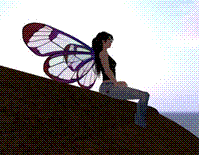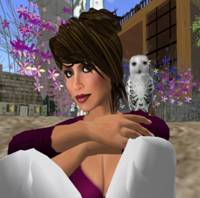
Session 3 - 1:30-2:45pm
Group G - Teaching Environment Sciences in a Virtual Toxic Town
 Tour Guide: Judith Kelly
Tour Guide: Judith KellySL Name: Delenn Daines
Judy Kelly (aka Delenn Daines) is a biology professor at Henry Ford Community College in Dearborn, Michigan. She first became interested in Second Life when she heard about it on a National Public Radio broadcast 3 years ago. For the last year she has been taking students in her Environmental Science class on virtual field trips in Second Life. Judy has been teaching full-time at HFCC for over 20 years. She has a Master's in Botany from Eastern Michigan University.
Session Description: Judy will be leading a tour of a Second Life sim called "Virtual Tox Town." Virtual Tox Town has two main themes: toxic chemicals and locations where they may be found, and environmental health concerns. The National Library of Medicine (NLM) designed Virtual Tox Town to be similar to the Web version so you can learn about the chemicals in a specific location, or you can choose a specific chemical and learn the locations in which the chemical may be found. You can also learn about environmental health concerns at each location. NLM has re-created Tox Town in a virtual world in an effort to expand the concept of Tox Town from a 2-D environment to a 3-D experience. The Web-based version of Tox Town allows for limited interactivity with chemicals and locations. By using a virtual world such as Second Life, NLM is able to greatly enhance the interactivity of the application and bring it closer to a real life experience. Virtual worlds also offer the opportunity for several avatars to interact with each other and the environment.
Group H - "Reel Learning" in Virtual Spaces
 Tour Guide: Marianne Malmstrom
Tour Guide: Marianne MalmstromSL Name: KnowClue Kidd
Marianne Malmstrom has been an educator for over 25 years. Her fascination with using emerging technologies in the classroom led to her current position as a middle school technology teacher at The Elisabeth Morrow School in Englewood, NJ. With her colleague, Sarah Rolle, she has developed a program rich in the use of multimedia. Her school has received two JPMorgan Chase awards for "Excellence in the Use of Multimedia" as part of WLIW's Teaching & Learning Celebration. Marianne presently runs Project Theater and the Multimedia Works group focused on best practices for using multimedia in the classroom.
In Second Life, Marianne is known as Knowclue Kidd. She has volunteered as an ISTE docent since May 2007 and has been responsible for organizing several collaborative projects with colleagues from around the world. As an early adopter of machinima (video created using 3D virtual worlds), Marianne has been keenly interested in how this new medium can be used for education. She has created several short machinimas including "ISTE in Second Life." Working with her 8th grade tech club, she is currently exploring the use of machinima in the classroom. (http://atlantisrisingcampus.us/faculty/marianne-malmstrom/)
Session Description: Educators entering virtual worlds instinctively understand the potential of these unique spaces but are still grappling with with the question of how to best use it.
At the Elisabeth Morrow School, before we adopt any new technology, we ALWAYS ask ourselves:
- Why are we using this technology?
- What does it allow us to do better?
- What does it allow us to do that we have never done before?
Come see how machinima in Second Life (creating video using 3D virtual worlds) holds real potential for developing several 21st century media literacy skills as well as proficiencies in communication, collaboration, creativity, and problem solving. See examples how learning is addressed. Participate first hand in a machinma project designed for the Texas Distance Learning Association.
Group I - Second Life, an Immersive World Learning Tool
 Tour Guide: Dr. Maryanne Maisano
Tour Guide: Dr. Maryanne MaisanoSL Name: DrM Magic
Dr. Maryanne Maisano, aka DrM Magic currently an Assistant Professor serving in the Department of Professional Education at University of North Carolina at Pembroke, strives to make a positive impact, focusing on implementing and sustaining educational change in the lives of her students. She brings a history of educational involvement in both public and private education, from being a classroom teacher to creating her own private school dedicated to the principles of diversity, social justice, and community participation. Dr. M is currently involved in research using Immersive World Technology in both online and face-to-face classes to facilitate instruction as well as professional development teacher training seminars and workshops.
 Tour Guide: Dr. Anthony Curtis
Tour Guide: Dr. Anthony CurtisSL Name: Stone Semyorka
Dr. Curtis has been a resident of Second Life since November 2006. In real life, he is a professor of mass communication at a major university system in the U.S. state of North Carolina teaching about virtual worlds, new and old media, internet and web, journalism, broadcasting, and public relations. He uses SL every day for alternative instruction sites and laboratory simulations for teaching and research.
On the Internet, he edits a major website about space and astronomy and also writes the Second Edition blog, which describes the passing scene, tracing the society, culture, politics and economics of Second Life. He loves to build in Second Life.
Session Description: For generations, desks and chalkboards have been the centerpiece of the classroom, with a teacher as the expositor of information to [hopefully] attentive students. And while that image still persists for those of us beyond the childhood years, the new generations of learners will gradually find such an image quaint and archaic. Because, already there is a "second life" poised not to replace but enrich the current physical classroom, beginning with a Virtual World, as we know, called Second Life (SL).
So what does a digital, culturally responsive classroom look like? What should be the instructional focus? How do we maintain a student-centered environment? Gay (2000) defines culturally responsive teaching as using the cultural knowledge, prior experiences, and performance styles to make learning more effective. With students learning and creating new technologies, the focus for the 21st century culturally classroom is Student-Centered Teaching and Learning.
Through Second Life, an Immersive World Learning Tool, the participants will have an interactive opportunity to take a virtual tour of UNCP in SL, explore opportunities to network with educators worldwide, and gather professional materials and resources that will define excellence in teaching and learning through a culturally-responsive model.